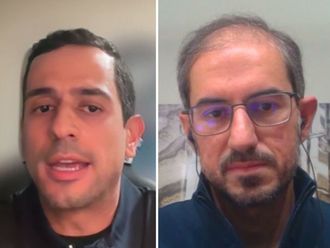A s the UAE progresses as a hub for business and education, an increasing number of foreigners continue to make the country their home. With the world continuing to develop into a global village, communication is key. Thus a universal language is needed to communicate across cultures. In today's global community, that language is English. Manal Ismail speaks with students and officials on the importance of the language and its role in education.
Browse through brochures of universities in the UAE and abroad, and you will notice that the primary language of instruction is English.
As a result, English proficiency has officially been recognised as a key factor for both academic and vocational success. In light of this, the Ministry of Education implemented the Common Educational Proficiency Assessment (CEPA) English examinations last year in schools following the Ministry of Education curriculum, with the goal of enhancing students' English language skills.
The test serves two purposes, said Annie Brown, Associate Director of Assessment and Professional Development at the Department of Higher Education and Policy Planning Coordination at the Ministry of Higher Education and Scientific Research.
"First, the [exams] work as part of the application requirements for federal tertiary institutes," she said. "Second, they form part of the grade twelve final examinations and account for one fourth of a student's overall grades. Thus, students from schools under the Ministry of Education are required to take it to graduate."
This year, the CEPA was administered to a total of 29,059 such students. There was an improvement in performance across the country, with 74 per cent of students achieving a score of 150, the minimum score required for entry to bachelors and higher diploma programs at UAE University, Zayed University and Higher Colleges of Technology, compared to 69 per cent in 2007.
Always used
English today is the primary language for academic instruction, not only in institutions abroad, but at all higher education institutions in the UAE as well.
CEPA exams are thus required to be taken by all students, regardless of what language they would study in following high school. Gulf News asked Brown what the effect of enforcing CEPA on students who study abroad at a non-English speaking institute would be.
"English is an international language that is used to communicate in company between members of varying backgrounds," said Brown. "English skills are an important component of both study and work."
As Shaikh Nahyan Bin Mubarak Al Nahyan, Minister of Higher Education and Scientific Research, told Gulf News: "English is the language of knowledge, IT and communication. Learning it is extremely beneficial to leading a successful life."
English is an international language that is used to communicate in company between members of varying backgrounds."
New methods: A changein learning styles
The CEPA English exam is a step away from traditional teaching methods, that foster the regurgitation of information, and one towards methods that nurture real learning, officials explain.
"I felt that students studied English by memorisation. They would often reproduce what they learned in class, which is not very effective," said Daphne Johnson, an English teacher at Al Dhabyania Private School.
"Students who were good in English but can't memorise would suffer and those who had good memorisation skills wouldn't truly grasp the concept."
Johnson said the CEPA truly tests a student's English competency by application and practical learning.
"These exams take students through a step-by-step process to ensure they learn English the right way," she said. "With students who haven't done this, they often found themselves unprepared for the English standards required at higher education levels."
Comparison: Not a replacement for other tests
Where does the CEPA fit among the many English proficiency tests available for non-native English speakers to take?
The CEPA is not meant to be a replacement for other tests such as the Test of English as a Foreign Language (TOEFL) and the International English Language Testing System (IELTS) which are required by many universities to determine the English proficiency of prospective students.
Rather, the score received in CEPA-English determines a student's eligibility to take the challenge test (the TOEFL or the IELTS), say officials. If students meet both the CEPA and the challenge test requirements as set by a university or college, they can go straight into the higher diploma programmes. If not, students are placed in a foundation programme to boost their English skills.
According to Annie Brown of the Ministry of Higher Education and Scientific Research, this is because the CEPA and challenge tests assess two different things. "Challenge tests like the TOEFL or IELTS are more proficiency based rather than placement based," she said. "Challenge tests prepare students for the skills they need in an academic environment. For example, listening skills and oral presentation. The CEPA English exams help us sort out the level students are currently at."
Students give exam the thumbs up
Students said the CEPA test was fairly simple and that they faced no challenges in taking it.
Jasem Al Qumzi, a business management student at Dubai Men's College (DMC) was required to take it upon entering college.
"It wasn't difficult at all," said Al Qumzi. "It was mainly testing basic English skills. And there was no pass or fail. The results determine our level of placement in the college."
Twelfth grade students from Al Dhabyania Private School shared Al Qumzi's experience. "It was very good and very easy," said Rola Abdul Karim. "I think it's very important as I'm planning to go to an English-speaking university and I'll need it to communicate with others from different backgrounds."
And though schools help prepare students, and there are practice tests on the CEPA website, most students claimed that they had done well without any rigorous preparation. Bayan Al Abbassi from Al Dhabyania Private School had only one suggestion.
"They should start teaching us the basics of the language from an earlier age," she said. "That way we can slowly advance our skills."
STUDENTS SPEAK
Abbas Al Hariri, Hamdan Bin Rashid High School, Dubai
The test was very easy. I prepared well by going to my teacher who gave me lessons to practice for the test. Though I believe that English is important to learn, I do believe they didn't give it much priority in school. They should have begun preparing us from an earlier age rather than doing it at the last minute."
Abdullah Abdul Rahman, Hamdan Bin Rashid High School, Dubai
Some parts of the test were easy, others were difficult. I found the vocabulary particularly hard, however I did well on the grammar and reading passages. Our school provide courses specifically tailored for the CEPA test, and I found many of the practice questions on the actual test. I think English is very important, as I will need it when furthering my education in the field of computers."
Hamad Khalifa, Hamdan Bin Rashid High School, Dubai
Taking the test went very smoothly. I never prepare for English tests because I find all of them exactly the same. However, our school provides enough help for us to prepare for the CEPA. They hired tutors and bought prep books and tests for students. I do find these tests important to help students improve their English skills as I saw the skills of my colleagues improve just while preparing for this test."
Faisal Al Saffar, BBA, Dubai Men's College
It's very important to be proficient in English as it is being used as the international language across all fields, especially in the UAE where many people are coming from outside and we need to share one language to communicate. The CEPA is essential for colleges to determine student's level of English so that they don't struggle in their courses. I found the test very easy and simple."
Do you think proficiency in the English language is important? Why or why not? Share your views with us:













